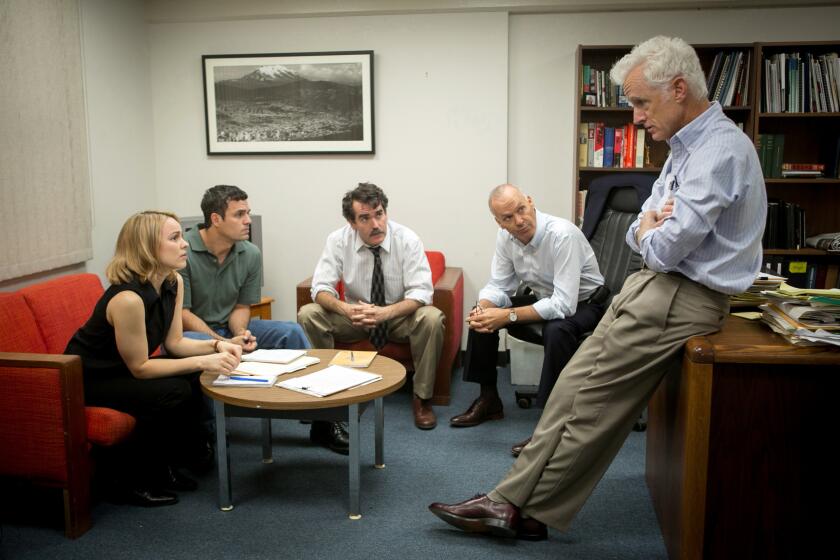Downsized and in Debt, Idealab Chief Still Pitching
Bill Gross, the founder of Idealab, has survived so many close calls he could be the Houdini of high-tech investing.
Hailed as a new-media prophet after launching the Pasadena company in 1996 to “incubate” start-up ventures, Gross was battered when the dot-com bubble burst in 2000. Several of his bets, including Web retailing highfliers EToys and Eve.com, went belly up.
When big-name investors led by mutual fund giant T. Rowe Price sued him for alleged self-dealing and fraud, the man Time magazine called the “billion-dollar brain” downsized, replacing his Ferrari with a Lexus and a minivan. Still, in December, Gross failed to pay off a $50-million personal loan.
Now, like a magician wriggling free of a straitjacket, the 47-year-old entrepreneur appears to be escaping ruin once again. At a special meeting today, Idealab shareholders will vote on a plan, already unanimously approved by the board, to pay off his loan, according to a recent proxy statement obtained by The Times.
Under the deal, Gross would repay the $50 million to the privately held company over the next four years, plus interest and a $1-million annual fee. That is enough time, the proxy asserts, for one or more of Idealab’s 14 companies -- operating in such fields as robotics, solar energy and online retailing -- to reach maturity and return a profit to shareholders.
The proxy warns that if Gross isn’t bailed out, and Bank of America forecloses on his loan, investors could suffer. The bank could use the Idealab stock it holds as collateral for the loan to force a premature liquidation of some assets at fire sale prices.
In an interview at Idealab’s headquarters, an open, hangar-like space where enterprises are identified by signs hanging from the ceiling, Gross said shareholders would be rewarded for their patience. Idealab, which has raised more than $1 billion from investors over the last decade, is on the verge of paying its first dividend, he said.
“We worked hard over the last four years to rebuild our reputation,” said the bespectacled inventor, who is not to be confused with the well-known bond fund manager of the same name. “My real pride will be when we prove that Idealab was a worthwhile investment, and that’s coming soon.”
In the view of some shareholders, however, it’s deja vu all over again.
Gross’ $50-million BofA loan was a central issue in the investor lawsuit filed in 2002. The complaint alleged that directors secretly tried to pay off the loan when it originally came due in 2000 “to keep Gross out of personal bankruptcy.”
The suit painted an unflattering portrait of alleged abuse, conflicts of interest and self-dealing by Gross and other Idealab officers and directors. It claimed that they used the company as a piggy bank and propped up its value “to perpetuate their salaries, perks and loans.”
Amid the tech-stock boom of the late 1990s, Gross certainly lived large. He bought not only a Ferrari but a jet (which he’s since sold) and four choice parcels of Pasadena land where he and his third wife, Idealab President Marcia Goodstein, built a multimillion-dollar home.
Many of the lawsuit’s claims were dismissed. Others were settled last year for pennies on the dollar. Gross said many of his investors mistakenly saw him as ostentatious -- the type of mogul who would buy Van Gogh’s “Starry Night” just to display it in Idealab’s lobby.
In fact, the painting is a copy of the masterpiece rendered by Gross himself.
“They riled themselves up to think that I paid $30 million for that painting out there,” Gross said, pointing to the lobby. “I’m not in it for the money.”
The son of an Encino orthodontist, Gross was an entrepreneur even as a teen. At 13, he bought candy in bulk to sell to his classmates. In high school, he sold solar energy kits of his own design by advertising in the back of science magazines. While an engineering major at Caltech, he patented loudspeaker technology and sold stereo systems that are still in use today.
After Gross sold two software firms he formed after college for a total of $110 million, he founded Idealab.
Gross, who keeps a fat three-ring binder filled with his brainstorms, modeled Idealab after the laboratory where Thomas Edison invented the light bulb and the phonograph. More than one start-up would be launched at a time, each getting seed capital that would not be increased until the enterprise attracted outside investors.
The concept was a magnet for celebrities. Director Steven Spielberg and actor Michael Douglas were among Idealab’s first investors. Each wrote checks for $200,000 at the time and remain backers to this day.
Jack Welch, the former chief executive of General Electric Co., and Compaq Computer founder Benjamin Rosen joined the board, although neither is currently a director.
Idealab prospered in the late 1990s, when Wall Street’s appetite for Internet stocks seemed insatiable. After opening on Nasdaq at $15, shares of GoTo.com, a search engine later renamed Overture Services Inc., soared to $108 in 1999. The market value of EToys peaked at $10 billion shortly after it went public that year.
In preparation for Idealab’s own initial public offering, planned for mid-2000, Gross took out the $50-million loan and bought himself $43 million worth of the company’s shares. He also sold a $1-billion stake to the investors who later sued him, based on a valuation of Idealab at $10 billion.
Then, the market turned, quashing plans for the IPO, upsetting investors who had expected a quick payday and leaving Gross in a financial lurch.
Traits that had long served Gross as an entrepreneur -- persistence, optimism, willingness to take unpopular positions -- suddenly began to look more like liabilities.
“Bill is off-the-charts smart, super-energetic and opinionated,” said Harry Chandler, a former top executive with Idealab’s Overture, which Yahoo acquired for $1.8 billion in 2003. “But as an operating businessman, he has some challenges. He needs checks and balances for the type of personality he is.”
Some CEOs of Idealab companies resented the fact that they were paid less than $100,000 a year plus stock options, while Gross’ compensation had soared to nearly $800,000 by 2002.
The double whammy of the market crash and the shareholder suit forced Gross to scale back. He closed satellite offices and laid off workers. Idealab now employs about 75 people, down from 250.
Gross also narrowed Idealab’s portfolio to about 20 companies, down from about 50 at its peak, and tightened Idealab’s investment criteria. Today, for example, the company would not fund a venture such as EToys that lacked protection against competition, he said.
“We got seduced,” Gross acknowledged. “We thought people would fund any company you started, so you might as well start as many as you can. We learned a tremendous amount in that period about how to operate our company and not get carried away.... Discipline was forced on us.”
Investors point to Idealab’s cash position, which has stabilized at about $130 million, as further proof that Gross may indeed be taking a more restrained approach. Idealab’s losses narrowed to $10 million in the first nine months of last year from $40 million during the same period a year earlier, according to the proxy.
Today, Gross’ profile seems to be rising again. One of his inventions -- a lower-cost rooftop solar contraption developed by Idealab’s Energy Innovations Inc. -- was honored in January at the World Economic Forum in Davos, Switzerland.
Gross has also won recognition as the pioneer of the pay-per-click system at the core of Google Inc.’s business. In this model, called “paid search,” advertisers featured in the margins of search results pay when users click through.
“In paid search, he was ahead of the pack by years, not months,” said Erik Straser, general partner with Mohr Davidow, one of the venture capital firms that have lined up to invest in Idealab of late. “There will be lots of things, in the fullness of time, that will be traced back to Bill.”
Investing in inventors, however, is “not for the light-hearted,” Gross himself said, because innovations may take a decade to catch on. But he has high hopes for a few ideas currently on deck.
Two that are generating buzz are Snap.com, a search engine that bills advertisers only when customers take steps toward a purchase, and X1 Technologies, which allows PC users to locate files, e-mails and attachments on their desktop.
Then there’s Internet Brands, which began as the online retailer CarsDirect and now sells mortgages, real estate and travel. With annual revenue estimated at $300 million and profit through the roof, Gross said, Internet Brands could conceivably wipe out all of Idealab’s losses if it soon goes public, as expected.
Which is why, the proxy essentially argues, it would be crazy to let Gross fail now.
Besides, Idealab could even make a profit on the loan. Under a deal struck with the bank, Idealab would buy the loan for $20 million, getting a steep discount, but would be paid back in full.
Gross -- who would sign on for another four years at his current salary of $650,000, with an annual bonus of as much as $850,000 -- would face stiffer payment terms than those imposed by the bank, the proxy states.
What will the shareholders decide? Steve Glenn, for one, hopes they’ll invest in Idealab’s richest resource: Gross.
“Bill is one of the most incredible entrepreneurs out there,” said Glenn, who once worked with Gross and now has his own start-up. “He has a higher percentage of executable ideas than any entrepreneur I know.”
*
(BEGIN TEXT OF INFOBOX)
On the launch pad
A parade of top-tier venture capital firms has lined up over the last year to invest in start-ups formed by Idealab, which had suffered from a four-year financing drought.
*--* Millions Type of Company raised Key investors business Energy $16.5 Mohr Davidow Affordable solar power Innovations Ventures PerfectMarket 10.5 Mayfield Internet search engine Technologies X1 Technologies 10.0 U.S. Venture Desktop search software Partners Insider Pages 8.5 Sequoia Capital, User-generated local Softbank Capital search engine Omnilux 8.0 Undisclosed Optical wireless technology Oraxion 4.2 Mohr Davidow Semiconductor industry Ventures technology
*--*
Source: Idealab






